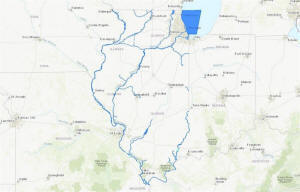Justices urge lawmakers to allow more public access to rivers
 Send a link to a friend
Send a link to a friend
[July 02, 2022]
By PETER HANCOCK
Capitol News Illinois
phancock@capitolnewsillinois.com
 SPRINGFIELD – The Illinois Supreme Court
has ruled that the public has no right to boat, fish or swim in small
rivers that flow across private property, but two justices are urging
the General Assembly to change that law. SPRINGFIELD – The Illinois Supreme Court
has ruled that the public has no right to boat, fish or swim in small
rivers that flow across private property, but two justices are urging
the General Assembly to change that law.
“The legislature should redefine navigability to be more inclusive
because that would promote the State’s interest in recreational uses of
waterways for all citizens of the State of Illinois,” Justice P. Scott
Neville, joined by Chief Justice Anne Burke, wrote in a separate opinion
to a recent case. “It is incumbent upon the legislature to realize that
there is an increasing social and economic need that riparian rights be
restricted for public recreational purposes.”
That was part of a concurring opinion in a recent decision involving a
dispute between two landowners who own property along the Mazon River in
Grundy County.
A portion of that river flows through a fossil-rich area known as the
Mazon Creek Fossil Beds, a national historic landmark near the river’s
confluence with the Illinois River, and both parties in the case operate
fossil-hunting businesses.
Adam Holm and his family own two separate parcels of property, one of
which is landlocked and only accessible from the river. To get to that
parcel, he would launch a kayak from his other property and row down the
river, taking him across property owned by Peter Kodat and others.

Kodat complained, accusing Holm of trespassing on his property, but Holm
claimed that as the owner of property along the river, he had a right to
access all parts of the river.
The case centered around an Illinois law that gives property owners the
right to control access to waters along their property, unless the
waters are classified as “navigable,” which, according to an earlier
Supreme Court decision, means “of sufficient depth to afford a channel
for use for commerce.”
In other words, unless a body of water is deep enough to carry barge or
ship traffic, property owners along that water have a right to bar
public access to it.
The Illinois Department of Natural Resources is the agency that
determines whether or not a lake, river or stream is navigable. It
currently lists 48 bodies of water, including Lake Michigan and six
branches of the Chicago River, as falling in that category.
[to top of second column]
|

Only 32 rivers and streams in Illinois are considered
"navigable" and thus open for public use, but two state Supreme
Court justices argue that it's time to change that law. (Credit:
Illinois Department of Natural Resources)

Thus, in a unanimous decision, the court said Kodat had the right to
prohibit Holm from kayaking on the portion of the river that flows
across his property.
“In our view, the legislature is the best venue to consider plaintiffs’
request for the creation of a new public policy on riparian rights for
nonnavigable rivers and streams in Illinois, which constitute the
majority of waterways in this state,” Justice Robert L. Carter wrote for
the majority.
But writing in what’s known as a “special concurrence” – in which a
justice agrees with the outcome of a case but not the opinion – Neville
wrote that he thinks it is time to change the law.
Neville argued that the doctrine used in Illinois, known as the
“Riparian Doctrine,” that gives property owners the right to control
access to rivers and streams that flow across their property is “archaic
and anachronistic” and should be replaced with one that recognizes the
public’s right to use those resources for recreation.
He also argued that the riparian doctrine has hindered Illinois from
developing more recreational use of waterways, noting that there are
“more than 87,000 miles of rivers and streams within its borders, but
only 32 rivers and streams are classified as navigable.”
“There is no question that the adoption of the recreational navigation
doctrine is supported by Illinois public policy favoring the use of
waterways for recreational purposes,” Neville wrote, citing a 1976 case
in which the court blocked the sale of a portion of Lake Michigan in
Chicago to U.S. Steel Corp. for the purpose of developing a steel plant
there. “According to this court, it is appropriate to observe that there
has developed a strong, though belated, interest in conserving natural
resources and in protecting and improving our physical environment.”
Capitol News Illinois is a nonprofit, nonpartisan news
service covering state government that is distributed to more than 400
newspapers statewide. It is funded primarily by the Illinois Press
Foundation and the Robert R. McCormick Foundation.
 |